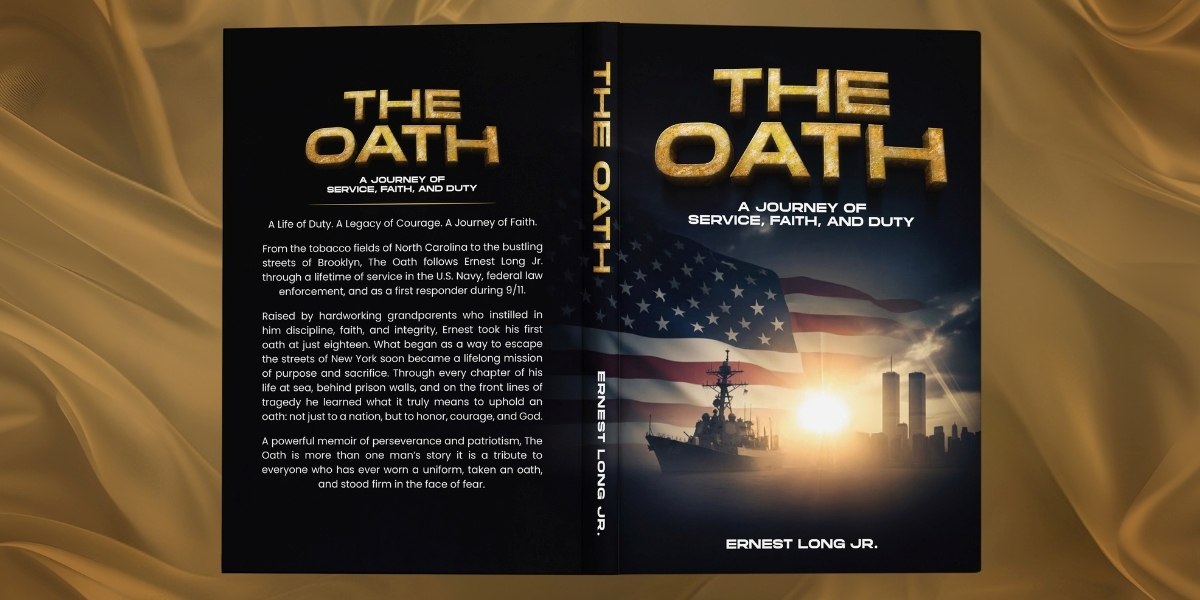By: Melville House Publishing
There comes a point in every serviceman’s life when the uniform is folded for the last time, the boots are placed quietly in the closet, and the echoes of drills and orders fade into the background. The days of rising before dawn and standing in formation are replaced by quieter mornings and slower rhythms. Yet for some, the promise made under oath never truly ends. It becomes something sacred. It turns into a way of life guided not by rules or rank but by faith, humility, and purpose.
For Ernest Long Jr., author of The Oath: A Journey of Service, Faith, and Duty, that promise began long before the military. It started in the heart of North Carolina, where, as a young boy, he learned the meaning of discipline, family, and faith. He spent his childhood summers working alongside his grandparents in the tobacco fields, feeding livestock, fetching water from the well, and walking to church every Sunday. Those experiences did more than shape his work ethic; they shaped his character. His grandmother’s devotion to faith and his grandfather’s commitment to hard work taught him that strength is not measured by physical might alone but by integrity and perseverance.

When Ernest later joined the United States Navy, he did so not simply to escape the hardship of his surroundings but to seek a purpose greater than himself. He recalls the first time he raised his right hand to take the military oath of service — a moment that, at the time, felt procedural. But as life would unfold, that same oath would define his journey. “I didn’t fully understand the meaning of that oath at eighteen,” Ernest shares in his memoir. “But over the years, I came to realize that service was never about the uniform. It was about purpose.”
During his years at sea, serving aboard ships like the USS Santa Barbara and the USS Fulton, Ernest found himself surrounded by men and women who shared the same desire to serve and protect. Each deployment carried its own lessons. Whether facing the grueling demands of the job or experiencing moments of solitude on distant waters, Ernest came to understand that faith was his anchor. It kept him steady through uncertainty and hardship. He began to see that service, when guided by faith, was more than a career — it was a calling.
When his naval service ended, Ernest transitioned into federal law enforcement, continuing the life of duty he had grown to respect. His work with the U.S. Park Police placed him on the front lines once again, this time protecting national landmarks and citizens rather than patrolling oceans. Each morning he put on his uniform with pride, aware that his oath to defend and protect was still alive.
That sense of calling was tested on September 11, 2001, a day the world will never forget. Ernest was on duty in New York when he heard the news that the first plane had struck the World Trade Center. Moments later, the second plane hit, and the gravity of what was happening became clear. Ernest and his fellow officers responded immediately, assisting in evacuating civilians and helping secure the area in lower Manhattan. “When the towers fell,” he recalls, “it was as if time stood still. But in that moment, faith had to stand taller than fear.”
Those who served on that day carried memories that would stay with them forever. For Ernest, it became another chapter in his lifelong understanding of what it means to keep an oath. Even after 9/11, his service continued through his role as a K9 handler with the Park Police, a position that demanded strength, compassion, and discipline. The bond between officer and service dog became yet another expression of teamwork, trust, and faith in action.
Eventually, years of service and the physical toll of injuries led Ernest to retirement. Yet even in stepping away from active duty, he never truly left his oath behind. “When you can no longer serve in the field,” he says, “you serve with your words, your heart, and your example.” That sentiment captures the essence of his book — that an oath is not confined to the years of active duty but extends into every act of honesty, kindness, and faith a person lives afterward.
The Oath: A Journey of Service, Faith, and Duty is not a story about medals, ranks, or accolades. It is a reflection on humility, courage, and the unshakable belief that true service continues long after the orders stop. Ernest’s life reminds us that service is not about being seen; it is about being steadfast.
True service does not end with retirement. It lives on in the way we treat others, the gratitude we express, and the faith we hold when times are uncertain. For Ernest Long Jr., the oath has never expired. It remains alive in his gratitude, in his storytelling, and in his unwavering belief that God’s plan is at work even in hardship.
“You can hang the medals on the wall,” Ernest writes, “but the real reward is knowing you kept your promise — to your country, to your family, and to God.”
In a world where promises often fade and duty is too easily forgotten, Ernest’s story serves as a reminder that the truest form of service comes from the heart. The uniform may fade, but the oath — the one built on faith, courage, and love — endures forever.


















